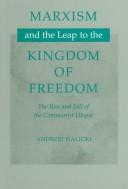Check nearby libraries
Buy this book

The author contributes to the explanation of the collapse of communism in the Soviet Union and Eastern Europe by showing the inherently utopian character of the idea of a marketless economy and by interpreting the Soviet communist experiment as a failed attempt to realize this utopia. Hence, he provides substantial arguments for the view that "really existing socialism" has never been a viable, stable alternative to the market economies of the West.
The book's title echoes Engels's phrase "the leap from the kingdom of necessity to the kingdom of freedom." "The kingdom of necessity" refers to the Marxist conception of the laws of history, "the leap" to the dictatorship of the proletariat, and "the kingdom of freedom" to the communist conception of freedom as control over economic and social forces. For Marx, the main enemy of human freedom was not political coercion but the "blind," uncontrollable forces of the market.
Thus freedom could be realized only through rational planning that would liberate people from their dependence on material things and alienated social forces.
The Leninist determination to realize this ideal regardless of social cost was supported by confidence that the scientific understanding of the laws of history provided (allegedly) by Marxism made the communist party virtually infallible and legitimized its claim to unlimited power.
Thus, Soviet totalitarianism was a predictable result of a politically forced development aimed toward "the kingdom of freedom." But the dependence of the Soviet regime on ideological legitimization was also its hidden weakness. The Soviet system was unable to develop self-regulating economic mechanisms and could exist only in conditions of political mobilization and ideocratic pressure. The inevitable erosion of the system's legitimizing ideology set in motion a slow retreat from totalitarianism and communism.
Under Gorbachev, the acceleration of this retreat brought about the dismantling of the entire system.
This book reconstructs Marx and Engels's theory of freedom, highlights its centrality to their vision of the communist society of the future, traces its development in the history of Marxist thought (including Marxism-Leninism), and explains how it was transformed at the height of its influence into a legitimation of totalitarian practices.
Check nearby libraries
Buy this book

Previews available in: English
Subjects
History, Freedom, Socialism, Communism, Communism, history, Utopias, Liberty, Socialism, history| Edition | Availability |
|---|---|
|
1
Marxism and the Leap to the Kingdom of Freedom: The Rise and Fall of the Communist Utopia
September 1, 1997, Stanford University Press
Paperback
in English
- New Ed edition
0804731640 9780804731645
|
zzzz
Libraries near you:
WorldCat
|
|
2
Marksizm i skok do królestwa wolności: dzieje komunistycznej utopii
1996, Wydawnictwo Naukowe PWN
in Polish
- Wyd. 1.
8301120479 9788301120474
|
zzzz
Libraries near you:
WorldCat
|
|
3
Marxism and the leap to the kingdom of freedom: the rise and fall of the Communist utopia
1995, Stanford University Press
in English
0804723842 9780804723848
|
aaaa
Libraries near you:
WorldCat
|
Book Details
Edition Notes
Includes bibliographical references (p. [619]-635) and index.
Classifications
The Physical Object
ID Numbers
Community Reviews (0)
Feedback?| July 16, 2024 | Edited by MARC Bot | import existing book |
| February 17, 2023 | Edited by ImportBot | import existing book |
| November 18, 2020 | Edited by MARC Bot | import existing book |
| August 23, 2020 | Edited by ImportBot | import existing book |
| December 10, 2009 | Created by WorkBot | add works page |










